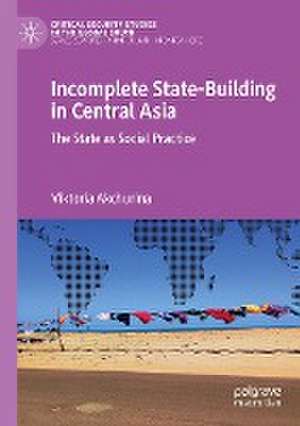Incomplete State-Building in Central Asia: The State as Social Practice: Critical Security Studies in the Global South
Autor Viktoria Akchurinaen Limba Engleză Paperback – 21 oct 2023
| Toate formatele și edițiile | Preț | Express |
|---|---|---|
| Paperback (1) | 640.88 lei 6-8 săpt. | |
| Springer International Publishing – 21 oct 2023 | 640.88 lei 6-8 săpt. | |
| Hardback (1) | 646.30 lei 6-8 săpt. | |
| Springer International Publishing – 20 oct 2022 | 646.30 lei 6-8 săpt. |
Preț: 640.88 lei
Preț vechi: 753.97 lei
-15% Nou
Puncte Express: 961
Preț estimativ în valută:
122.63€ • 133.63$ • 103.34£
122.63€ • 133.63$ • 103.34£
Carte tipărită la comandă
Livrare economică 23 aprilie-07 mai
Preluare comenzi: 021 569.72.76
Specificații
ISBN-13: 9783031141843
ISBN-10: 3031141849
Pagini: 342
Ilustrații: XVII, 342 p. 7 illus., 6 illus. in color.
Dimensiuni: 148 x 210 mm
Greutate: 0.43 kg
Ediția:1st ed. 2022
Editura: Springer International Publishing
Colecția Palgrave Macmillan
Seria Critical Security Studies in the Global South
Locul publicării:Cham, Switzerland
ISBN-10: 3031141849
Pagini: 342
Ilustrații: XVII, 342 p. 7 illus., 6 illus. in color.
Dimensiuni: 148 x 210 mm
Greutate: 0.43 kg
Ediția:1st ed. 2022
Editura: Springer International Publishing
Colecția Palgrave Macmillan
Seria Critical Security Studies in the Global South
Locul publicării:Cham, Switzerland
Cuprins
1. The Incomplete State: Fifty Shades of Failure.- 2. Understanding State-Building in Central Asia.- 3. Follow the Water: Soviet Legacy as Cross-Border Societal Interdependence.- 4. Impact of External Actors on States and Societies.- 5. When Elites Meet: The Struggle for Power and its Social Meaning.
Notă biografică
Viktoria Akchurina is Senior Lecturer at the OSCE Academy in Bishkek. Her research focuses on state-building in Central Asia and the Middle East, comparatively. She is an author of a number of academic publications on the elite formation, power and hegemony, the incomplete state, security and radicalization, border and water management in central Eurasia. She co-edited a Special Section on ‘Power and Competing Regionalism in a Wider Europe’ in Europe-Asia Studies. In her previous capacity as a researcher at TRENDS Consulting in Abu-Dhabi, she published a number of policy papers on the Belt and Road Initiative in the Middle East and conducted research on Russian foreign policy in Syria.
Previously, Viktoria taught at the MA program in Peace and Development at Dauphine University in Paris andconducted research on borders, informal cartography, and the "lost cities" in Eurasia at the Centre of "Geopolitics of Risk" at the Ecole Normale Superieure in Paris.
Previously, Viktoria taught at the MA program in Peace and Development at Dauphine University in Paris andconducted research on borders, informal cartography, and the "lost cities" in Eurasia at the Centre of "Geopolitics of Risk" at the Ecole Normale Superieure in Paris.
Textul de pe ultima copertă
This book is about transformation of the state and an incomplete state-building. It defies the transitology assumption of continuity, linearity and dichotomy of formal and informal in the transformation of the state. Contrary to the conventional approaches, it claims that any social order or its political scaffolding, the state, is always incomplete and we need to develop cognitive maps to better understand that incompleteness. It reflects on the social practices, processes and patterns that evolve as a non-linear result of three sets of factors: those that are historical, external, and elite-driven. Three Central Asian states - Uzbekistan, Tajikistan, and Kyrgyzstan - are examined here comparatively as case studies, as Central Asia represents an interesting terrain to challenge conventional understanding of the state. Specifically, the book captures a paradox at hand: how come three states, which made different political, economic, cultural, and social choices at the outset of their independence in the 1990s, have ended up as so-called “weak states” in the 2000s and onwards? This puzzle can be better understood through looking at the relationship among three main sets of factors that shape state-building processes, such as history, external actors, and local elites. This book applies an interdisciplinary approach, combining political anthropology, political economy, sociology, and political science. It helps conceptualize and understand social and political order beyond the “failed state” paradigm.
Viktoria Akchurina is Senior Lecturer at the OSCE Academy in Bishkek, Kyrgyzstan. Her research focuses on state-building in Central Asia and the Middle East, comparatively.
Caracteristici
A comparative analysis of the incomplete state in central Eurasia, focusing on Uzbekistan, Tajikistan, and Kyrgyzstan Social history of resistance, violence, border and water management in disputed borderlands of the Fergana Valley Interdisciplinary conceptual framework on how neo-liberalization can lead to re-traditionalization of societies





